Nursing Ethics: Confidentiality and Autonomy in Clinical Situations
VerifiedAdded on 2022/11/10
|7
|1977
|465
AI Summary
This article discusses the ethical and legal principles of confidentiality and autonomy in nursing, with a focus on a case study involving a minor patient's pregnancy. It also explores the options available to nurses in addressing ethical problems and reflects on the deontological perspective of the nursing profession.
Contribute Materials
Your contribution can guide someone’s learning journey. Share your
documents today.
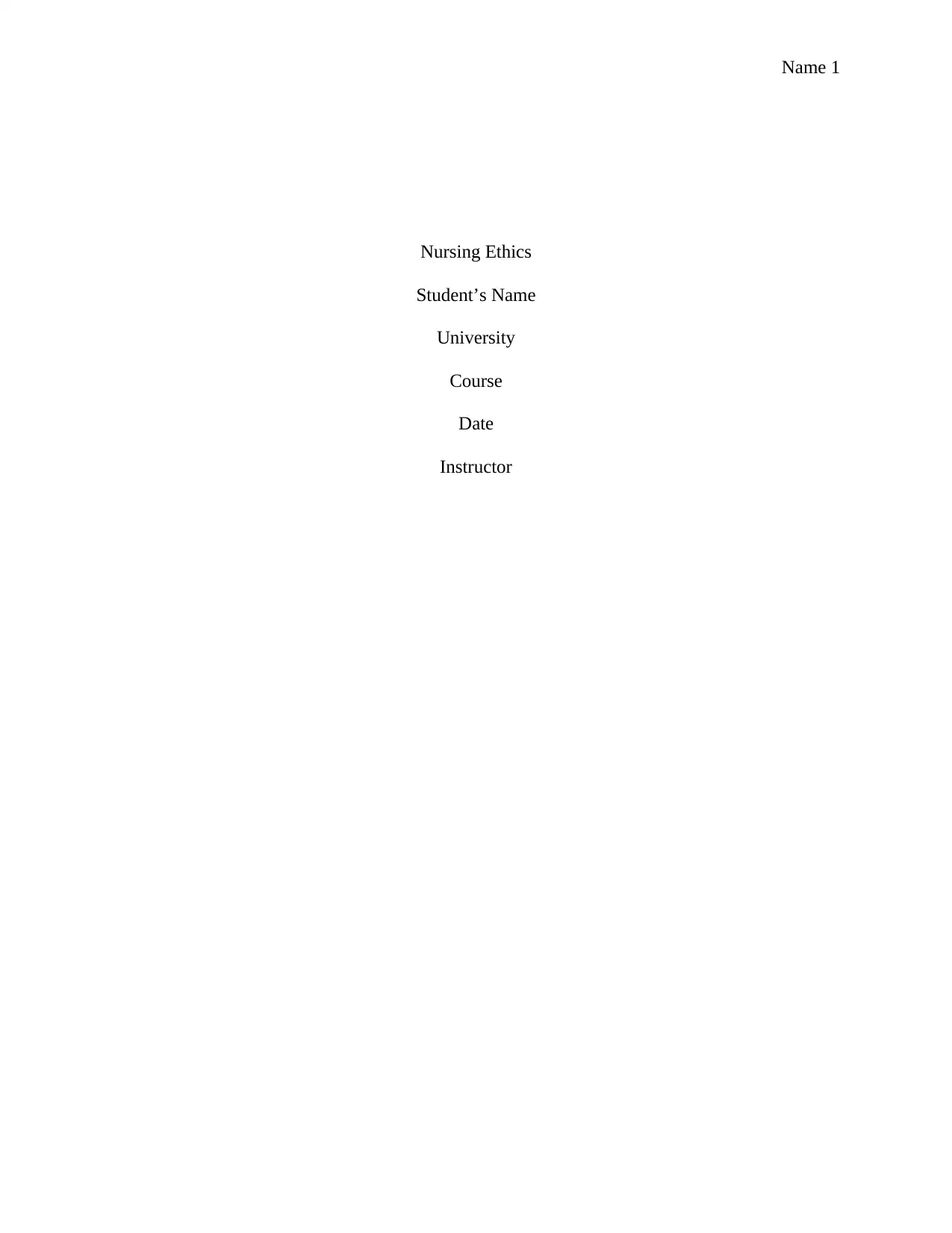
Name 1
Nursing Ethics
Student’s Name
University
Course
Date
Instructor
Nursing Ethics
Student’s Name
University
Course
Date
Instructor
Secure Best Marks with AI Grader
Need help grading? Try our AI Grader for instant feedback on your assignments.
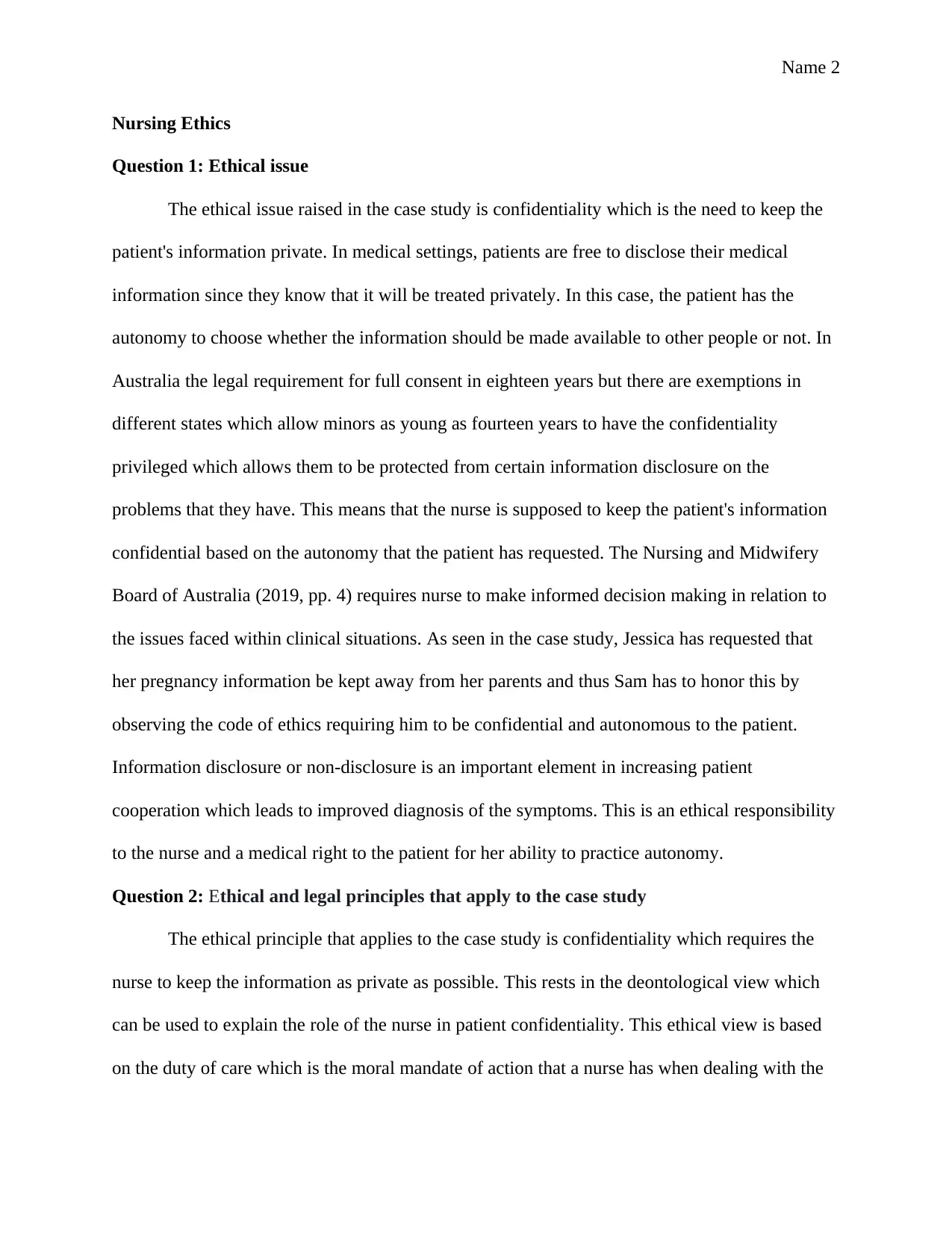
Name 2
Nursing Ethics
Question 1: Ethical issue
The ethical issue raised in the case study is confidentiality which is the need to keep the
patient's information private. In medical settings, patients are free to disclose their medical
information since they know that it will be treated privately. In this case, the patient has the
autonomy to choose whether the information should be made available to other people or not. In
Australia the legal requirement for full consent in eighteen years but there are exemptions in
different states which allow minors as young as fourteen years to have the confidentiality
privileged which allows them to be protected from certain information disclosure on the
problems that they have. This means that the nurse is supposed to keep the patient's information
confidential based on the autonomy that the patient has requested. The Nursing and Midwifery
Board of Australia (2019, pp. 4) requires nurse to make informed decision making in relation to
the issues faced within clinical situations. As seen in the case study, Jessica has requested that
her pregnancy information be kept away from her parents and thus Sam has to honor this by
observing the code of ethics requiring him to be confidential and autonomous to the patient.
Information disclosure or non-disclosure is an important element in increasing patient
cooperation which leads to improved diagnosis of the symptoms. This is an ethical responsibility
to the nurse and a medical right to the patient for her ability to practice autonomy.
Question 2: Ethical and legal principles that apply to the case study
The ethical principle that applies to the case study is confidentiality which requires the
nurse to keep the information as private as possible. This rests in the deontological view which
can be used to explain the role of the nurse in patient confidentiality. This ethical view is based
on the duty of care which is the moral mandate of action that a nurse has when dealing with the
Nursing Ethics
Question 1: Ethical issue
The ethical issue raised in the case study is confidentiality which is the need to keep the
patient's information private. In medical settings, patients are free to disclose their medical
information since they know that it will be treated privately. In this case, the patient has the
autonomy to choose whether the information should be made available to other people or not. In
Australia the legal requirement for full consent in eighteen years but there are exemptions in
different states which allow minors as young as fourteen years to have the confidentiality
privileged which allows them to be protected from certain information disclosure on the
problems that they have. This means that the nurse is supposed to keep the patient's information
confidential based on the autonomy that the patient has requested. The Nursing and Midwifery
Board of Australia (2019, pp. 4) requires nurse to make informed decision making in relation to
the issues faced within clinical situations. As seen in the case study, Jessica has requested that
her pregnancy information be kept away from her parents and thus Sam has to honor this by
observing the code of ethics requiring him to be confidential and autonomous to the patient.
Information disclosure or non-disclosure is an important element in increasing patient
cooperation which leads to improved diagnosis of the symptoms. This is an ethical responsibility
to the nurse and a medical right to the patient for her ability to practice autonomy.
Question 2: Ethical and legal principles that apply to the case study
The ethical principle that applies to the case study is confidentiality which requires the
nurse to keep the information as private as possible. This rests in the deontological view which
can be used to explain the role of the nurse in patient confidentiality. This ethical view is based
on the duty of care which is the moral mandate of action that a nurse has when dealing with the
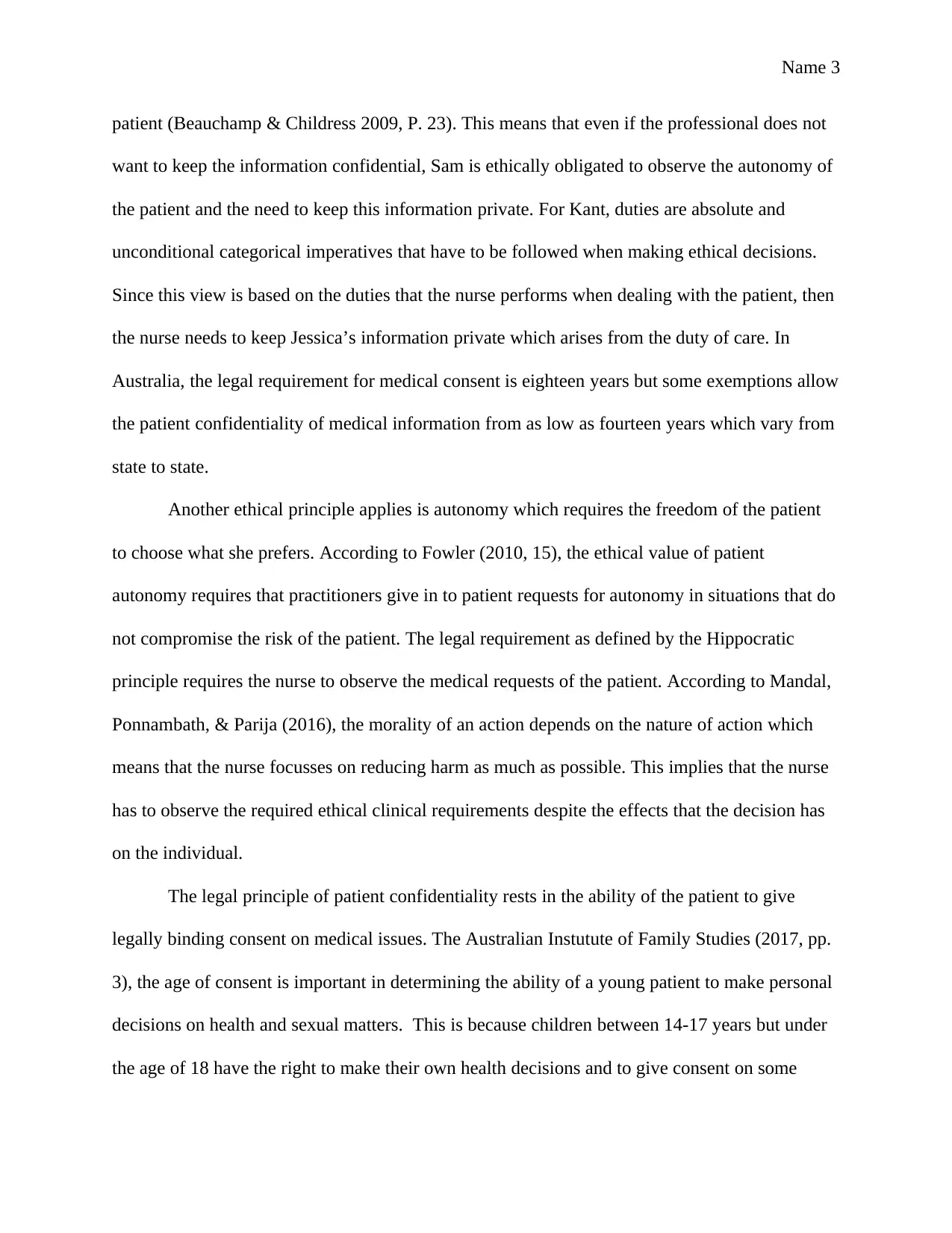
Name 3
patient (Beauchamp & Childress 2009, P. 23). This means that even if the professional does not
want to keep the information confidential, Sam is ethically obligated to observe the autonomy of
the patient and the need to keep this information private. For Kant, duties are absolute and
unconditional categorical imperatives that have to be followed when making ethical decisions.
Since this view is based on the duties that the nurse performs when dealing with the patient, then
the nurse needs to keep Jessica’s information private which arises from the duty of care. In
Australia, the legal requirement for medical consent is eighteen years but some exemptions allow
the patient confidentiality of medical information from as low as fourteen years which vary from
state to state.
Another ethical principle applies is autonomy which requires the freedom of the patient
to choose what she prefers. According to Fowler (2010, 15), the ethical value of patient
autonomy requires that practitioners give in to patient requests for autonomy in situations that do
not compromise the risk of the patient. The legal requirement as defined by the Hippocratic
principle requires the nurse to observe the medical requests of the patient. According to Mandal,
Ponnambath, & Parija (2016), the morality of an action depends on the nature of action which
means that the nurse focusses on reducing harm as much as possible. This implies that the nurse
has to observe the required ethical clinical requirements despite the effects that the decision has
on the individual.
The legal principle of patient confidentiality rests in the ability of the patient to give
legally binding consent on medical issues. The Australian Instutute of Family Studies (2017, pp.
3), the age of consent is important in determining the ability of a young patient to make personal
decisions on health and sexual matters. This is because children between 14-17 years but under
the age of 18 have the right to make their own health decisions and to give consent on some
patient (Beauchamp & Childress 2009, P. 23). This means that even if the professional does not
want to keep the information confidential, Sam is ethically obligated to observe the autonomy of
the patient and the need to keep this information private. For Kant, duties are absolute and
unconditional categorical imperatives that have to be followed when making ethical decisions.
Since this view is based on the duties that the nurse performs when dealing with the patient, then
the nurse needs to keep Jessica’s information private which arises from the duty of care. In
Australia, the legal requirement for medical consent is eighteen years but some exemptions allow
the patient confidentiality of medical information from as low as fourteen years which vary from
state to state.
Another ethical principle applies is autonomy which requires the freedom of the patient
to choose what she prefers. According to Fowler (2010, 15), the ethical value of patient
autonomy requires that practitioners give in to patient requests for autonomy in situations that do
not compromise the risk of the patient. The legal requirement as defined by the Hippocratic
principle requires the nurse to observe the medical requests of the patient. According to Mandal,
Ponnambath, & Parija (2016), the morality of an action depends on the nature of action which
means that the nurse focusses on reducing harm as much as possible. This implies that the nurse
has to observe the required ethical clinical requirements despite the effects that the decision has
on the individual.
The legal principle of patient confidentiality rests in the ability of the patient to give
legally binding consent on medical issues. The Australian Instutute of Family Studies (2017, pp.
3), the age of consent is important in determining the ability of a young patient to make personal
decisions on health and sexual matters. This is because children between 14-17 years but under
the age of 18 have the right to make their own health decisions and to give consent on some
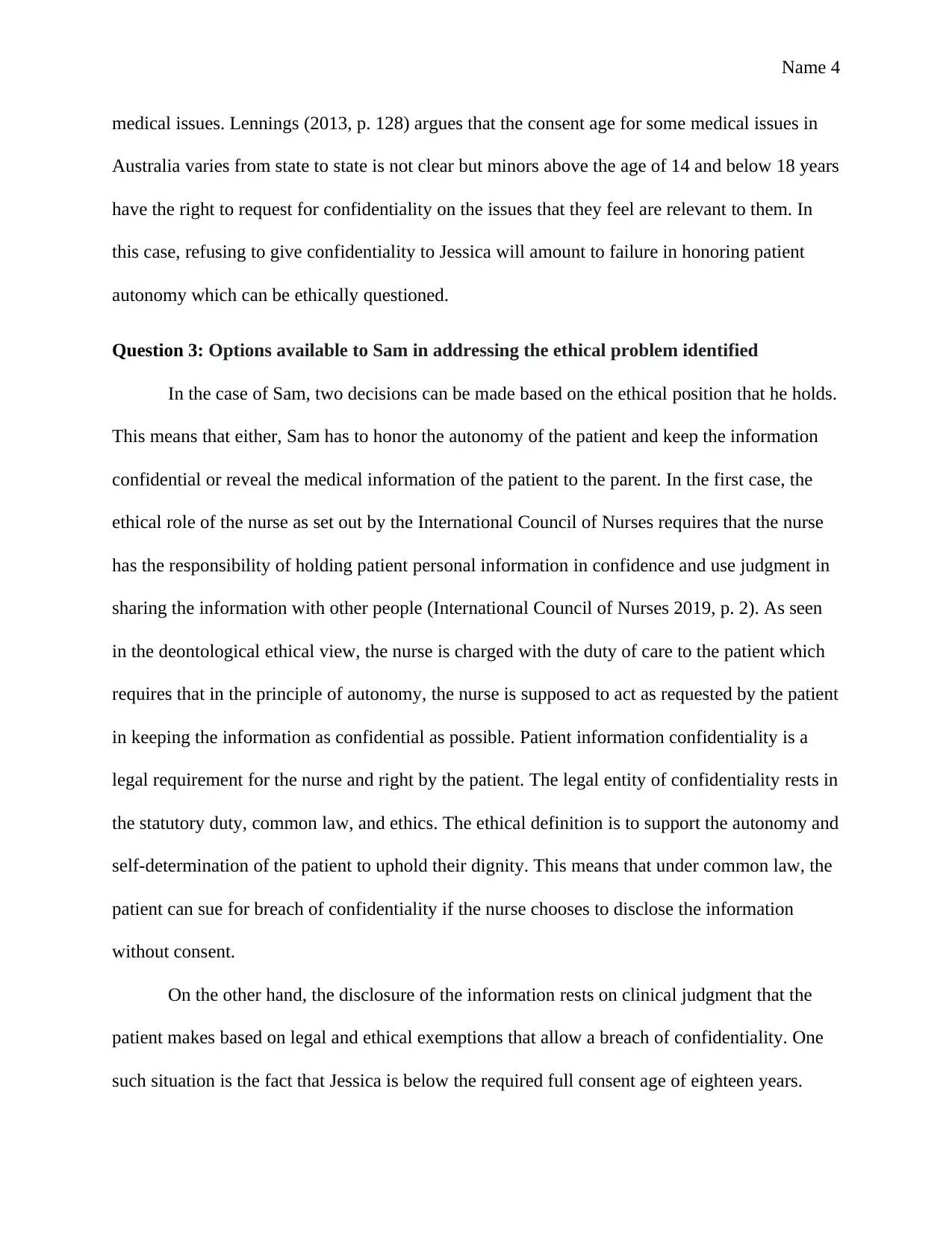
Name 4
medical issues. Lennings (2013, p. 128) argues that the consent age for some medical issues in
Australia varies from state to state is not clear but minors above the age of 14 and below 18 years
have the right to request for confidentiality on the issues that they feel are relevant to them. In
this case, refusing to give confidentiality to Jessica will amount to failure in honoring patient
autonomy which can be ethically questioned.
Question 3: Options available to Sam in addressing the ethical problem identified
In the case of Sam, two decisions can be made based on the ethical position that he holds.
This means that either, Sam has to honor the autonomy of the patient and keep the information
confidential or reveal the medical information of the patient to the parent. In the first case, the
ethical role of the nurse as set out by the International Council of Nurses requires that the nurse
has the responsibility of holding patient personal information in confidence and use judgment in
sharing the information with other people (International Council of Nurses 2019, p. 2). As seen
in the deontological ethical view, the nurse is charged with the duty of care to the patient which
requires that in the principle of autonomy, the nurse is supposed to act as requested by the patient
in keeping the information as confidential as possible. Patient information confidentiality is a
legal requirement for the nurse and right by the patient. The legal entity of confidentiality rests in
the statutory duty, common law, and ethics. The ethical definition is to support the autonomy and
self-determination of the patient to uphold their dignity. This means that under common law, the
patient can sue for breach of confidentiality if the nurse chooses to disclose the information
without consent.
On the other hand, the disclosure of the information rests on clinical judgment that the
patient makes based on legal and ethical exemptions that allow a breach of confidentiality. One
such situation is the fact that Jessica is below the required full consent age of eighteen years.
medical issues. Lennings (2013, p. 128) argues that the consent age for some medical issues in
Australia varies from state to state is not clear but minors above the age of 14 and below 18 years
have the right to request for confidentiality on the issues that they feel are relevant to them. In
this case, refusing to give confidentiality to Jessica will amount to failure in honoring patient
autonomy which can be ethically questioned.
Question 3: Options available to Sam in addressing the ethical problem identified
In the case of Sam, two decisions can be made based on the ethical position that he holds.
This means that either, Sam has to honor the autonomy of the patient and keep the information
confidential or reveal the medical information of the patient to the parent. In the first case, the
ethical role of the nurse as set out by the International Council of Nurses requires that the nurse
has the responsibility of holding patient personal information in confidence and use judgment in
sharing the information with other people (International Council of Nurses 2019, p. 2). As seen
in the deontological ethical view, the nurse is charged with the duty of care to the patient which
requires that in the principle of autonomy, the nurse is supposed to act as requested by the patient
in keeping the information as confidential as possible. Patient information confidentiality is a
legal requirement for the nurse and right by the patient. The legal entity of confidentiality rests in
the statutory duty, common law, and ethics. The ethical definition is to support the autonomy and
self-determination of the patient to uphold their dignity. This means that under common law, the
patient can sue for breach of confidentiality if the nurse chooses to disclose the information
without consent.
On the other hand, the disclosure of the information rests on clinical judgment that the
patient makes based on legal and ethical exemptions that allow a breach of confidentiality. One
such situation is the fact that Jessica is below the required full consent age of eighteen years.
Secure Best Marks with AI Grader
Need help grading? Try our AI Grader for instant feedback on your assignments.
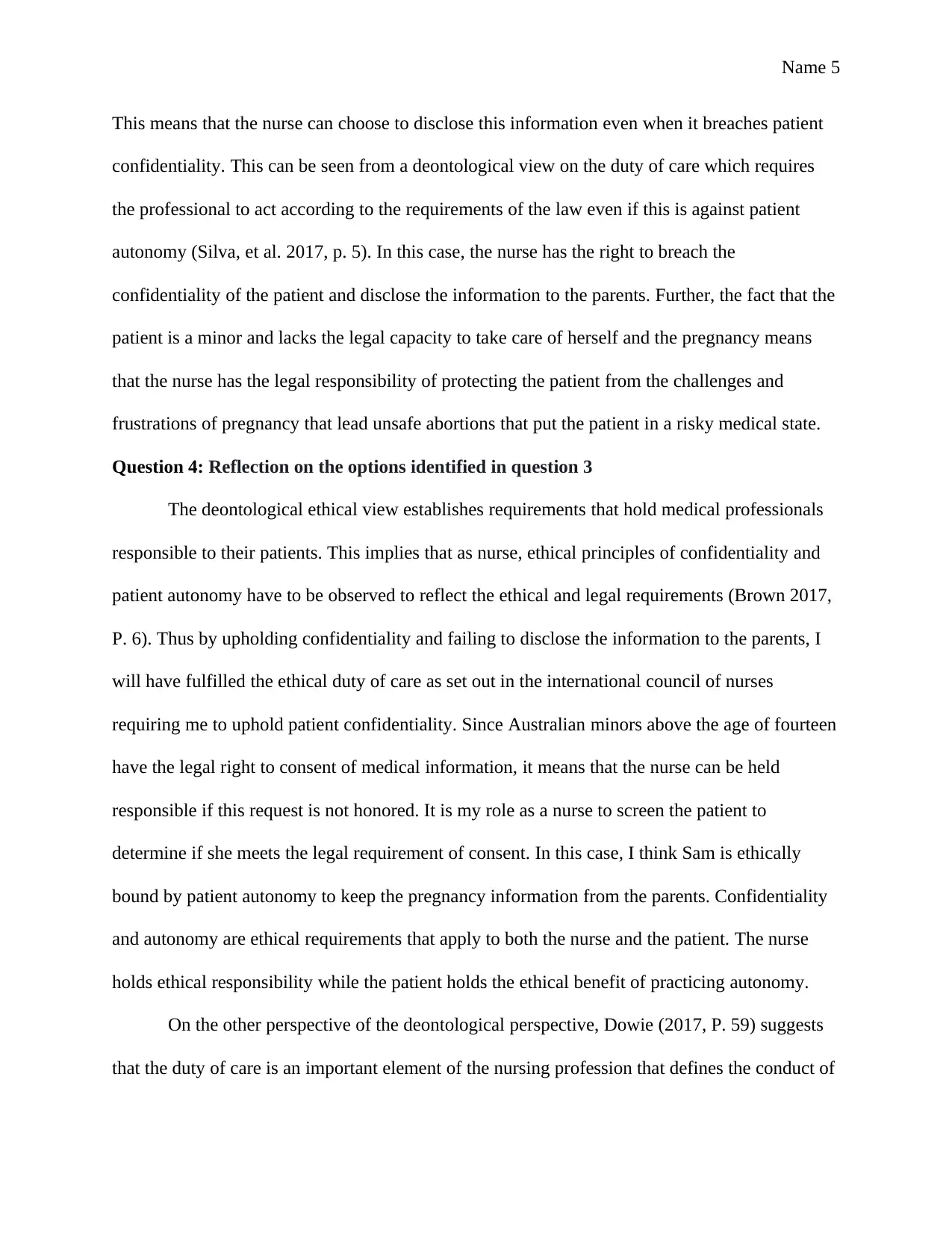
Name 5
This means that the nurse can choose to disclose this information even when it breaches patient
confidentiality. This can be seen from a deontological view on the duty of care which requires
the professional to act according to the requirements of the law even if this is against patient
autonomy (Silva, et al. 2017, p. 5). In this case, the nurse has the right to breach the
confidentiality of the patient and disclose the information to the parents. Further, the fact that the
patient is a minor and lacks the legal capacity to take care of herself and the pregnancy means
that the nurse has the legal responsibility of protecting the patient from the challenges and
frustrations of pregnancy that lead unsafe abortions that put the patient in a risky medical state.
Question 4: Reflection on the options identified in question 3
The deontological ethical view establishes requirements that hold medical professionals
responsible to their patients. This implies that as nurse, ethical principles of confidentiality and
patient autonomy have to be observed to reflect the ethical and legal requirements (Brown 2017,
P. 6). Thus by upholding confidentiality and failing to disclose the information to the parents, I
will have fulfilled the ethical duty of care as set out in the international council of nurses
requiring me to uphold patient confidentiality. Since Australian minors above the age of fourteen
have the legal right to consent of medical information, it means that the nurse can be held
responsible if this request is not honored. It is my role as a nurse to screen the patient to
determine if she meets the legal requirement of consent. In this case, I think Sam is ethically
bound by patient autonomy to keep the pregnancy information from the parents. Confidentiality
and autonomy are ethical requirements that apply to both the nurse and the patient. The nurse
holds ethical responsibility while the patient holds the ethical benefit of practicing autonomy.
On the other perspective of the deontological perspective, Dowie (2017, P. 59) suggests
that the duty of care is an important element of the nursing profession that defines the conduct of
This means that the nurse can choose to disclose this information even when it breaches patient
confidentiality. This can be seen from a deontological view on the duty of care which requires
the professional to act according to the requirements of the law even if this is against patient
autonomy (Silva, et al. 2017, p. 5). In this case, the nurse has the right to breach the
confidentiality of the patient and disclose the information to the parents. Further, the fact that the
patient is a minor and lacks the legal capacity to take care of herself and the pregnancy means
that the nurse has the legal responsibility of protecting the patient from the challenges and
frustrations of pregnancy that lead unsafe abortions that put the patient in a risky medical state.
Question 4: Reflection on the options identified in question 3
The deontological ethical view establishes requirements that hold medical professionals
responsible to their patients. This implies that as nurse, ethical principles of confidentiality and
patient autonomy have to be observed to reflect the ethical and legal requirements (Brown 2017,
P. 6). Thus by upholding confidentiality and failing to disclose the information to the parents, I
will have fulfilled the ethical duty of care as set out in the international council of nurses
requiring me to uphold patient confidentiality. Since Australian minors above the age of fourteen
have the legal right to consent of medical information, it means that the nurse can be held
responsible if this request is not honored. It is my role as a nurse to screen the patient to
determine if she meets the legal requirement of consent. In this case, I think Sam is ethically
bound by patient autonomy to keep the pregnancy information from the parents. Confidentiality
and autonomy are ethical requirements that apply to both the nurse and the patient. The nurse
holds ethical responsibility while the patient holds the ethical benefit of practicing autonomy.
On the other perspective of the deontological perspective, Dowie (2017, P. 59) suggests
that the duty of care is an important element of the nursing profession that defines the conduct of
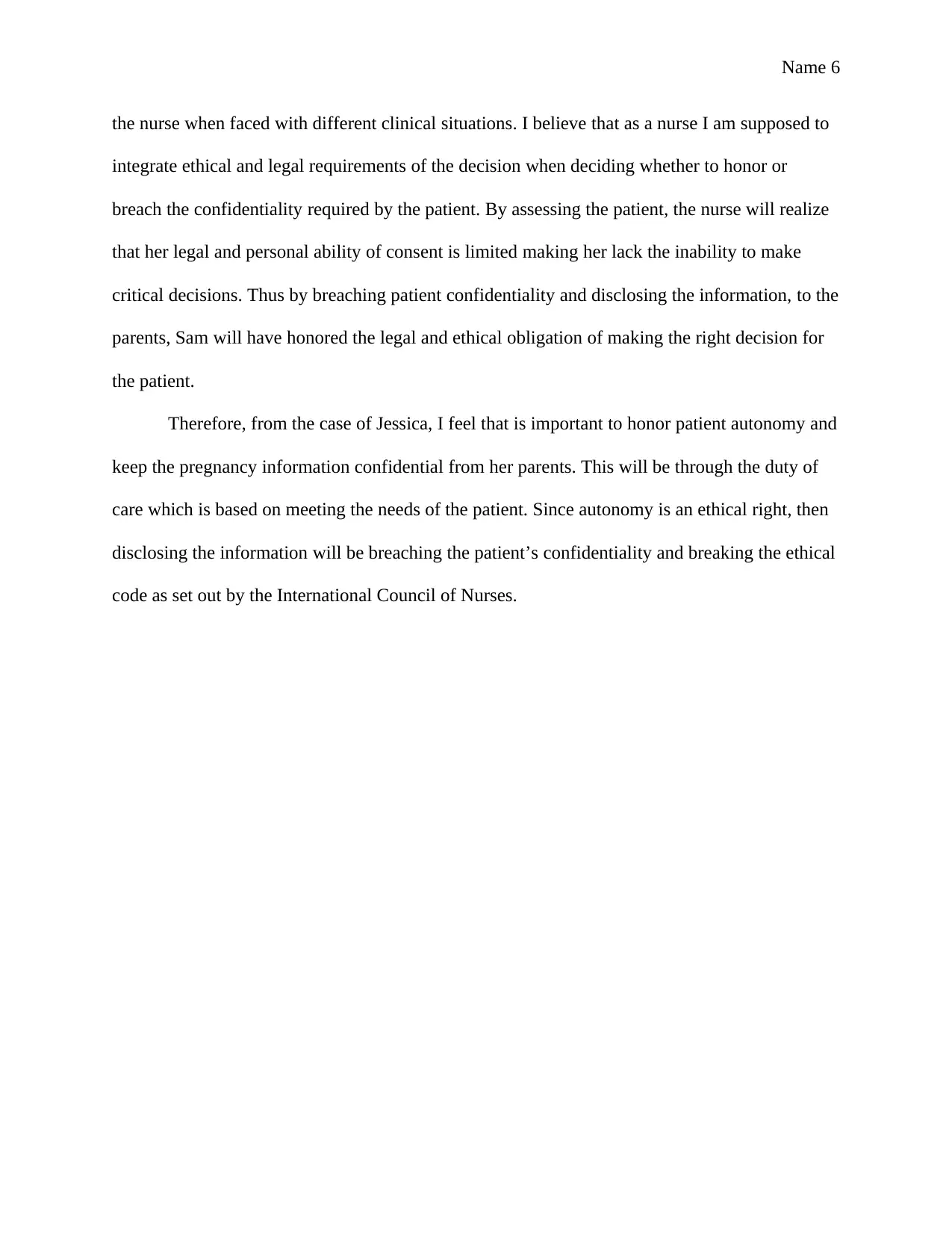
Name 6
the nurse when faced with different clinical situations. I believe that as a nurse I am supposed to
integrate ethical and legal requirements of the decision when deciding whether to honor or
breach the confidentiality required by the patient. By assessing the patient, the nurse will realize
that her legal and personal ability of consent is limited making her lack the inability to make
critical decisions. Thus by breaching patient confidentiality and disclosing the information, to the
parents, Sam will have honored the legal and ethical obligation of making the right decision for
the patient.
Therefore, from the case of Jessica, I feel that is important to honor patient autonomy and
keep the pregnancy information confidential from her parents. This will be through the duty of
care which is based on meeting the needs of the patient. Since autonomy is an ethical right, then
disclosing the information will be breaching the patient’s confidentiality and breaking the ethical
code as set out by the International Council of Nurses.
the nurse when faced with different clinical situations. I believe that as a nurse I am supposed to
integrate ethical and legal requirements of the decision when deciding whether to honor or
breach the confidentiality required by the patient. By assessing the patient, the nurse will realize
that her legal and personal ability of consent is limited making her lack the inability to make
critical decisions. Thus by breaching patient confidentiality and disclosing the information, to the
parents, Sam will have honored the legal and ethical obligation of making the right decision for
the patient.
Therefore, from the case of Jessica, I feel that is important to honor patient autonomy and
keep the pregnancy information confidential from her parents. This will be through the duty of
care which is based on meeting the needs of the patient. Since autonomy is an ethical right, then
disclosing the information will be breaching the patient’s confidentiality and breaking the ethical
code as set out by the International Council of Nurses.
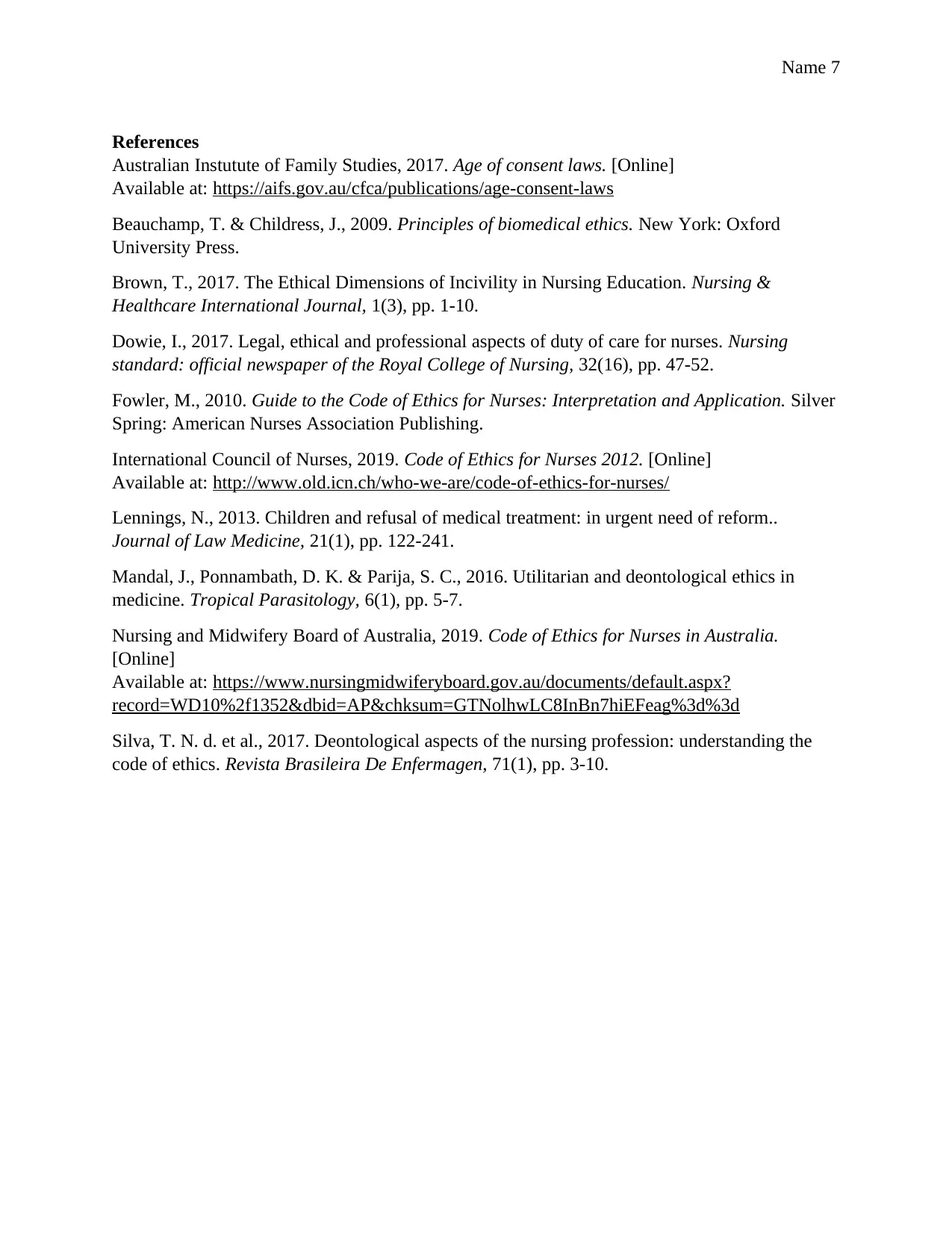
Name 7
References
Australian Instutute of Family Studies, 2017. Age of consent laws. [Online]
Available at: https://aifs.gov.au/cfca/publications/age-consent-laws
Beauchamp, T. & Childress, J., 2009. Principles of biomedical ethics. New York: Oxford
University Press.
Brown, T., 2017. The Ethical Dimensions of Incivility in Nursing Education. Nursing &
Healthcare International Journal, 1(3), pp. 1-10.
Dowie, I., 2017. Legal, ethical and professional aspects of duty of care for nurses. Nursing
standard: official newspaper of the Royal College of Nursing, 32(16), pp. 47-52.
Fowler, M., 2010. Guide to the Code of Ethics for Nurses: Interpretation and Application. Silver
Spring: American Nurses Association Publishing.
International Council of Nurses, 2019. Code of Ethics for Nurses 2012. [Online]
Available at: http://www.old.icn.ch/who-we-are/code-of-ethics-for-nurses/
Lennings, N., 2013. Children and refusal of medical treatment: in urgent need of reform..
Journal of Law Medicine, 21(1), pp. 122-241.
Mandal, J., Ponnambath, D. K. & Parija, S. C., 2016. Utilitarian and deontological ethics in
medicine. Tropical Parasitology, 6(1), pp. 5-7.
Nursing and Midwifery Board of Australia, 2019. Code of Ethics for Nurses in Australia.
[Online]
Available at: https://www.nursingmidwiferyboard.gov.au/documents/default.aspx?
record=WD10%2f1352&dbid=AP&chksum=GTNolhwLC8InBn7hiEFeag%3d%3d
Silva, T. N. d. et al., 2017. Deontological aspects of the nursing profession: understanding the
code of ethics. Revista Brasileira De Enfermagen, 71(1), pp. 3-10.
References
Australian Instutute of Family Studies, 2017. Age of consent laws. [Online]
Available at: https://aifs.gov.au/cfca/publications/age-consent-laws
Beauchamp, T. & Childress, J., 2009. Principles of biomedical ethics. New York: Oxford
University Press.
Brown, T., 2017. The Ethical Dimensions of Incivility in Nursing Education. Nursing &
Healthcare International Journal, 1(3), pp. 1-10.
Dowie, I., 2017. Legal, ethical and professional aspects of duty of care for nurses. Nursing
standard: official newspaper of the Royal College of Nursing, 32(16), pp. 47-52.
Fowler, M., 2010. Guide to the Code of Ethics for Nurses: Interpretation and Application. Silver
Spring: American Nurses Association Publishing.
International Council of Nurses, 2019. Code of Ethics for Nurses 2012. [Online]
Available at: http://www.old.icn.ch/who-we-are/code-of-ethics-for-nurses/
Lennings, N., 2013. Children and refusal of medical treatment: in urgent need of reform..
Journal of Law Medicine, 21(1), pp. 122-241.
Mandal, J., Ponnambath, D. K. & Parija, S. C., 2016. Utilitarian and deontological ethics in
medicine. Tropical Parasitology, 6(1), pp. 5-7.
Nursing and Midwifery Board of Australia, 2019. Code of Ethics for Nurses in Australia.
[Online]
Available at: https://www.nursingmidwiferyboard.gov.au/documents/default.aspx?
record=WD10%2f1352&dbid=AP&chksum=GTNolhwLC8InBn7hiEFeag%3d%3d
Silva, T. N. d. et al., 2017. Deontological aspects of the nursing profession: understanding the
code of ethics. Revista Brasileira De Enfermagen, 71(1), pp. 3-10.
1 out of 7
Related Documents
Your All-in-One AI-Powered Toolkit for Academic Success.
+13062052269
info@desklib.com
Available 24*7 on WhatsApp / Email
![[object Object]](/_next/static/media/star-bottom.7253800d.svg)
Unlock your academic potential
© 2024 | Zucol Services PVT LTD | All rights reserved.




